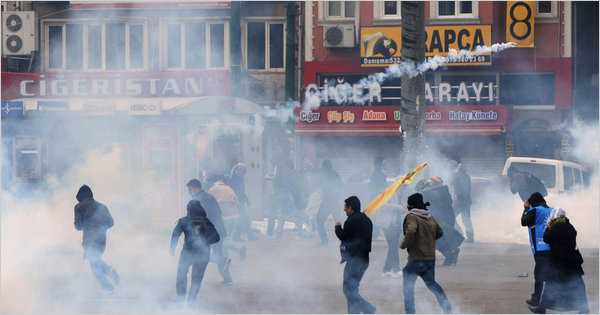By LANDON THOMAS Jr.
Published: April 21, 2011

DIYARBAKIR, Turkey — As more than 5,000 Kurds bent their heads to the ground in prayer on the main square of this provincial capital in Turkey’s volatile southeast, the voice of the imam rang out.
“No one can deny us the right that God gave us to speak our own language, in our schools or in our mosques,” the religious leader said in Kurdish, the language of Turkey’s 12 million to 15 million Kurds that the Turkish state still forbids the official use of in schools, mosques and government offices. “To do this is against God and the Koran — we are united with our Arab brothers and we want our rights.”
Against the backdrop of the Arab Spring, Turkey’s ever restive Kurds have begun a fresh push to achieve what they have been fighting for since the founding of the Turkish republic in 1923: true freedom of representation and the right to be educated in their mother tongue.
Whereas in the past, the main force behind this impetus has been a bloody guerrilla war, it is now a campaign of civil disobedience that Kurdish leaders here say is inspired not just by the events in neighboring Syria as well as Egypt, Yemen and Libya, but by the fight for civil rights in the United States in the 1960s.
“Our struggle is not just for our rights, but to bring democracy to Turkey,” Mehmet Ali Aydin, the chairman of the Diyarbakir branch of the Kurdish Peace and Democracy Party, known as the B.D.P. for the initials of its Kurdish name, said in an interview. “Forty years ago blacks and whites in America could not eat together. Now the president of your country is black — we are trying to follow in the same steps.”
As the religiously conservative government of Prime Minister Recep Tayyip Erdogan prepares for nationwide elections in June, this newly assertive drive led by the B.D.P. is seen as a democratic litmus test for Mr. Erdogan.
Arguably Turkey’s most powerful and regionally influential leader since Kemal Ataturk, the founder of the republic, Mr. Erdogan, who has transformed Turkey into an economic dynamo, has drawn increasing criticism at home and abroad for a recent crackdown on journalists, writers and other critics.
Those concerns were amplified this week when Turkey’s electoral body disqualified 12 parliamentary candidates, seven of whom were from the B.D.P., from running in the June elections. The decision set off violent protests not just in traditional Kurdish hotbeds like this city, Van and Hakkari but in Istanbul as well. B.D.P. leaders threatened to boycott the elections. On Thursday, the electoral body revised its decision, saying that eight of the barred candidates were now eligible, following appeals by the candidates. But it was unclear whether that would mollify Kurdish anger.
All of which represents an awkward challenge for Mr. Erdogan — who had urged Egypt’s former leader, Hosni Mubarak, to listen to his own people during the Egyptian uprising — and to Turkey’s broader reputation as the region’s most advanced democracy.
For a political party that has been closed down six times, the four demands that underpin the B.D.P.’s protest movement ask much of a state that has always been extremely sensitive to any perceived threat to its unity.
The demands call for the right for Kurds to be educated in their own language and the freedom to use it in the political arena; the immediate cessation of military operations against Kurds by the Turkish Army; the release of all political prisoners, including Abdullah Ocalan, the leader of the Kurds’ illegal military wing, the P.K.K.; and the removal of the controversial 10 percent electoral threshold that bars any party that cannot attract that share of the national vote from gaining seats in Parliament.
In its blend of the reasonable, like language and representation rights, and the more far-fetched, like the release of Mr. Ocalan, the Kurdish demands exemplify the tensions within the movement between those who want change through the ballot box and those who prefer to secure it by more violent means.
Perhaps no one embodies this push and pull more so than Abdullah Demirbas, the Kurdish mayor of one of Diyarbakir’s larger municipalities. Jailed in 2009 for having used Kurdish in an official capacity as mayor, he was released last year and was recently re-elected.
Over lunch at a local restaurant, where he was frequently interrupted by his constituents giving their best wishes, Mr. Demirbas recounted the story of his 18-year-old son who abandoned high school two years ago to join the P.K.K. and its armed struggle.
via Kurds Renew Movement for Civil Rights in Turkey – NYTimes.com.

Leave a Reply